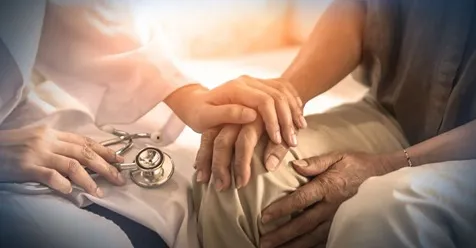Sharp Home Care Blog
Coronavirus and the future of elder care

Coronavirus is a wake up call for how pathetic elder care is in the United States, and the future care of our senior loved ones must change.
Studies show that the elderly are happier, safer and age better in their own home surrounded by the things, people, and pets they love and remember. The below article posted in Yahoo News touches on what needs to be done in our country to help start the ball rolling to have government funding for in-home elder care and increase funding for facility elder care.
As the Yahoo News article says, “We must address the ageism that leads to poor elder care. Let’s stop the ageist rhetoric [they’re old, let em die]* — which only increases suffering by devaluing the elderly at a time when they are already vulnerable — and focus on the VALUE they bring to society.” – Tracy Davis, Star-Ledger (Newark,NJ)
It’s difficult for me to face the fact that I am now counted as elderly. I’m an old fart now, but I know I have a lot left in me to give to this world and my family. (And….I have two or more books to publish!) I still have value, and I trust my children to know me when the time comes for me to be in elder care. I want to be in my home or their home. Not in a facility.
* Disclaimer: “they’re old, let em die” are words I’ve heard. They are not Tracy Davis’ words.
Nursing homes, coronavirus and the future of elder care
by Mike Bebernes, Editor, Yahoo News 360, published July 7, 2020

What’s happening
At least 54,000 residents and workers at nursing homes and other elder-care facilities have died of COVID-19 in the United States, according to data compiled by the New York Times in late June. The U.S. has more deaths connected to nursing homes than any country other than Brazil has in total.
COVID-19 has proved to be especially dangerous for the elderly. People over 65 represent more than three-quarters of America’s nearly 131,000 coronavirus deaths. The age of nursing home residents, combined with the ease with which the virus spreads in communal spaces, has led to devastating outbreaks. Some facilities have been connected to more than 70 deaths.
Across the U.S., there are about 1.4 million people living in nursing homes. Though their residents make up less than 1 percent of the country’s population, nursing homes account for more than 40 percent of America’s COVID-19 deaths. The fatality rate for nursing home residents who contract the virus is more than three times the national average, according to the New York Times.
Why there’s debate
To some experts, the coronavirus has highlighted flaws in the U.S. nursing home system that can only be fixed by radically changing the way the country cares for the elderly. Critics argue that nursing homes were vulnerable to the virus not just because they house older people in tight quarters, but also because of long-standing problems like limited resources, poor government support, underpaid staff, lack of oversight and financial structures that incentivize substandard care. The size of the country’s older population is expected to nearly double by 2050, which could further strain the already strained nursing home system.
A better plan, some argue, would be a major increase in at-home care for seniors supported by government funds, new technology and community members. Some studies suggest that at-home care is cheaper and leads to better health outcomes. Shifting the majority of elder care to the home would allow nursing homes to focus on supporting people with intensive health needs, experts say.
Others say a massive restructuring of elder care could leave behind poor people and people of color, who are less likely to have stable housing and the money needed to support at-home care. Many of the issues with the current system, they argue, can be fixed through more funding for care and staff pay, a more equitable health care system and more government accountability.
Perspectives
The government should help fund at-home care for seniors
“The desire is there to stay at home, but until the government takes action, nothing will change. Maybe the extraordinary events of the past few months will finally be the catalyst we need to move forward to aging at home.” — Julian Gray and Frank Petrich, Pittsburgh Post-Gazette
The virus has drawn attention to ongoing problems with nursing homes
“The pandemic doesn’t have many silver linings, but as the number of nursing-home deaths piles up, the news media is being forced to cover a world many of us would prefer to ignore.” — Charles C. Camosy, New York Times
Technology and family support can ease the burden of at-home care
“One alternative is supporting in-home care for seniors to age in place, undergirded by technology that can virtually detect falls, provide companionship through robotics, monitor the frequency of sleeping and toilet visits, or even check how often the fridge door is opened. The pandemic should prompt us to explore these alternatives, or options for generational living where grandparents reside with younger generations, contributing to the mortgage and pitching in with child care.” — Michele L. Norris, Washington Post
The country needs to prepare for a major spike in the elderly population
“Long, full lives are our new normal — thanks in no small part to modern medicine. If the coronavirus pandemic has upsides, I hope one is that it challenges doctors, politicians, and everyone else to more thoughtfully adapt to this new reality for the human species.” — Louise Aronson, Atlantic
There may not be enough workers to support a transition to at-home care
“Transition to home-based care would require more home health care workers — many of whom work for lower pay, and with fewer labor protections, than their counterparts in facilities. In some places, there are already too few people willing to fill those roles.” — Michael Schulson, Mother Jones
Nursing home staff deserve more money and better protection
“Before the COVID-19 pandemic, our system of caring for the elderly was like dry kindling waiting for a spark. Low-wage workers are not to be blamed for the concentration of coronavirus cases and deaths in nursing homes. Instead, they need to be appreciated and protected. Doing so will protect us all.” — Don Taylor, Tampa Bay Times
We must address the ageism that leads to poor elder care
“Let’s stop the ageist rhetoric — which only increases suffering by devaluing the elderly at a time when they are already vulnerable — and focus on the value they bring to society.” — Tracy Davis, Star-Ledger (Newark, N.J.)
The business model of nursing homes results in substandard care
“The pay in the industry is low, the demands are high, and many say the incentives are all wrong. A look through the piles of federal lawsuits filed against nursing homes in recent years yields a similar dismal tale time and again. Too many patients needing too much care. Far too few staff, paid far too little.” — Brett Arends, MarketWatch
A transition to at-home care could make those left in nursing homes even more vulnerable
“Some experts worry that if too much funding shifts toward home care, that could gut already cash-strapped nursing homes, which could create an imbalance for those stuck there — who are more likely to be poorer residents and people of color.” — Nina Feldman and Laura Benshoff, WHYY
Read Yahoo News actual article here.
Call Sharp Home Care for peace of mind. We can help you or your loved one be safe and live well at home. We’re here 24/7 to help you.
Call 770-693-1870. Or click HERE to schedule a free in-home consultation.
For information on the Coronavirus (COVID-19) please visit: The Center for Disease Control
Images: Getty Images and DepositPhotos
Categories
Recent Posts
Coronavirus and the future of elder care

Coronavirus is a wake up call for how pathetic elder care is in the United States, and the future care of our senior loved ones must change.
Studies show that the elderly are happier, safer and age better in their own home surrounded by the things, people, and pets they love and remember. The below article posted in Yahoo News touches on what needs to be done in our country to help start the ball rolling to have government funding for in-home elder care and increase funding for facility elder care.
As the Yahoo News article says, “We must address the ageism that leads to poor elder care. Let’s stop the ageist rhetoric [they’re old, let em die]* — which only increases suffering by devaluing the elderly at a time when they are already vulnerable — and focus on the VALUE they bring to society.” – Tracy Davis, Star-Ledger (Newark,NJ)
It’s difficult for me to face the fact that I am now counted as elderly. I’m an old fart now, but I know I have a lot left in me to give to this world and my family. (And….I have two or more books to publish!) I still have value, and I trust my children to know me when the time comes for me to be in elder care. I want to be in my home or their home. Not in a facility.
* Disclaimer: “they’re old, let em die” are words I’ve heard. They are not Tracy Davis’ words.

Nursing homes, coronavirus and the future of elder care
by Mike Bebernes, Editor, Yahoo News 360, published July 7, 2020
What’s happening
At least 54,000 residents and workers at nursing homes and other elder-care facilities have died of COVID-19 in the United States, according to data compiled by the New York Times in late June. The U.S. has more deaths connected to nursing homes than any country other than Brazil has in total.
COVID-19 has proved to be especially dangerous for the elderly. People over 65 represent more than three-quarters of America’s nearly 131,000 coronavirus deaths. The age of nursing home residents, combined with the ease with which the virus spreads in communal spaces, has led to devastating outbreaks. Some facilities have been connected to more than 70 deaths.
Across the U.S., there are about 1.4 million people living in nursing homes. Though their residents make up less than 1 percent of the country’s population, nursing homes account for more than 40 percent of America’s COVID-19 deaths. The fatality rate for nursing home residents who contract the virus is more than three times the national average, according to the New York Times.
Why there’s debate
To some experts, the coronavirus has highlighted flaws in the U.S. nursing home system that can only be fixed by radically changing the way the country cares for the elderly. Critics argue that nursing homes were vulnerable to the virus not just because they house older people in tight quarters, but also because of long-standing problems like limited resources, poor government support, underpaid staff, lack of oversight and financial structures that incentivize substandard care. The size of the country’s older population is expected to nearly double by 2050, which could further strain the already strained nursing home system.
A better plan, some argue, would be a major increase in at-home care for seniors supported by government funds, new technology and community members. Some studies suggest that at-home care is cheaper and leads to better health outcomes. Shifting the majority of elder care to the home would allow nursing homes to focus on supporting people with intensive health needs, experts say.
Others say a massive restructuring of elder care could leave behind poor people and people of color, who are less likely to have stable housing and the money needed to support at-home care. Many of the issues with the current system, they argue, can be fixed through more funding for care and staff pay, a more equitable health care system and more government accountability.
Perspectives
The government should help fund at-home care for seniors
“The desire is there to stay at home, but until the government takes action, nothing will change. Maybe the extraordinary events of the past few months will finally be the catalyst we need to move forward to aging at home.” — Julian Gray and Frank Petrich, Pittsburgh Post-Gazette
The virus has drawn attention to ongoing problems with nursing homes
“The pandemic doesn’t have many silver linings, but as the number of nursing-home deaths piles up, the news media is being forced to cover a world many of us would prefer to ignore.” — Charles C. Camosy, New York Times
Technology and family support can ease the burden of at-home care
“One alternative is supporting in-home care for seniors to age in place, undergirded by technology that can virtually detect falls, provide companionship through robotics, monitor the frequency of sleeping and toilet visits, or even check how often the fridge door is opened. The pandemic should prompt us to explore these alternatives, or options for generational living where grandparents reside with younger generations, contributing to the mortgage and pitching in with child care.” — Michele L. Norris, Washington Post
The country needs to prepare for a major spike in the elderly population
“Long, full lives are our new normal — thanks in no small part to modern medicine. If the coronavirus pandemic has upsides, I hope one is that it challenges doctors, politicians, and everyone else to more thoughtfully adapt to this new reality for the human species.” — Louise Aronson, Atlantic
There may not be enough workers to support a transition to at-home care
“Transition to home-based care would require more home health care workers — many of whom work for lower pay, and with fewer labor protections, than their counterparts in facilities. In some places, there are already too few people willing to fill those roles.” — Michael Schulson, Mother Jones
Nursing home staff deserve more money and better protection
“Before the COVID-19 pandemic, our system of caring for the elderly was like dry kindling waiting for a spark. Low-wage workers are not to be blamed for the concentration of coronavirus cases and deaths in nursing homes. Instead, they need to be appreciated and protected. Doing so will protect us all.” — Don Taylor, Tampa Bay Times
We must address the ageism that leads to poor elder care
“Let’s stop the ageist rhetoric — which only increases suffering by devaluing the elderly at a time when they are already vulnerable — and focus on the value they bring to society.” — Tracy Davis, Star-Ledger (Newark, N.J.)
The business model of nursing homes results in substandard care
“The pay in the industry is low, the demands are high, and many say the incentives are all wrong. A look through the piles of federal lawsuits filed against nursing homes in recent years yields a similar dismal tale time and again. Too many patients needing too much care. Far too few staff, paid far too little.” — Brett Arends, MarketWatch
A transition to at-home care could make those left in nursing homes even more vulnerable
“Some experts worry that if too much funding shifts toward home care, that could gut already cash-strapped nursing homes, which could create an imbalance for those stuck there — who are more likely to be poorer residents and people of color.” — Nina Feldman and Laura Benshoff, WHYY
Read Yahoo News actual article here.
Call Sharp Home Care for peace of mind. We can help you or your loved one be safe and live well at home. We’re here 24/7 to help you.
Call 770-693-1870. Or click HERE to schedule a free in-home consultation.
For information on the Coronavirus (COVID-19) please visit: The Center for Disease Control
Images: Getty Images and DepositPhotos



